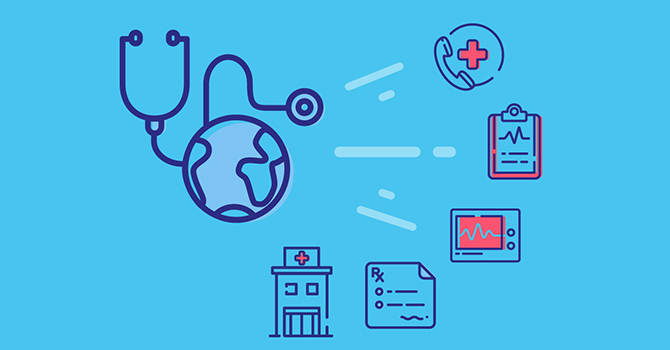Why Healthcare RCM is Necessary for Financial Wellness in Medical Practices
Why Healthcare RCM is Necessary for Financial Wellness in Medical Practices
Blog Article
Comprehending the Duty of Medical Care RCM in Enhancing Financial Performance and Individual Satisfaction
Navigating the ins and outs of Medical care Earnings Cycle Management (RCM) is crucial for attaining optimal financial performance while concurrently boosting patient complete satisfaction. RCM's capability to enhance invoicing, guarantee accurate coding, and quicken claims processing stands as a keystone of modern-day health care procedures. Nevertheless, the nuanced interplay between these components warrants a closer examination to completely value their effect on both medical care service providers and individuals. As we explore the transformative potential of RCM, inquiries concerning its calculated application and future advancements bid, encouraging understandings that can redefine industry criteria and individual experiences alike.

Key Components of RCM
In the complicated landscape of medical care, Earnings Cycle Monitoring (RCM) is essential in making certain monetary stability and operational efficiency. A comprehensive RCM system encompasses numerous critical parts, each playing an essential duty in the smooth administration of a doctor's monetary processes. Person enrollment and eligibility confirmation are fundamental steps, making certain that exact individual info is captured and insurance policy coverage is verified before services are rendered. This lowers the threat of insurance claim denials and increases the repayment procedure.

Fee capture is another important part, including the precise recording of solutions offered to people. It ensures that all billable solutions are made up, thus taking full advantage of income capacity. Simultaneously, medical coding translates patient encounters right into standard codes, which are crucial for invoicing and governing conformity.
Claims submission and administration adhere to, involving the preparation and submission of insurance claims to payers. This procedure calls for meticulous attention to information to decrease mistakes and protect against hold-ups. Rejection management is a positive technique to resolve and fix denied insurance claims, guarding earnings streams.
Lastly, payment publishing and individual collections finish the cycle, ensuring payments are accurately tape-recorded and outstanding balances are pursued. Together, these components form a robust framework that sustains the economic and functional health of healthcare organizations.
Impact on Financial Performance
Effective Revenue Cycle Management (RCM) significantly affects a medical care company's economic efficiency by enhancing capital and lowering profits leak. RCM includes the extensive billing and collection processes that make certain doctor successfully handle their monetary transactions from patient enrollment to final settlement. By streamlining these procedures, organizations can reduce rejected cases, accelerate repayment cycles, and improve general financial wellness.
Monetary performance is boosted with meticulous monitoring of billing treatments, which includes exact coding and prompt submission of cases. This decreases the possibility of case denials and denials, which can dramatically impede revenue circulation if not attended to quickly. In addition, incorporating sophisticated innovation services facilitates real-time monitoring of claims and financial metrics, giving medical care administrators with the devices necessary to make enlightened strategic decisions.

Enhancing Individual Satisfaction
While enhancing monetary efficiency is a key objective of Income Cycle Management (RCM), it also plays a critical role in enhancing person satisfaction. By reducing administrative burdens, RCM permits medical care carriers to concentrate more on patient treatment, which straight enhances client complete satisfaction.

RCM likewise improves client satisfaction through reliable interaction. By preserving an extensive database of person details, RCM facilitates improved interaction between patients and click here to read medical care providers, ensuring people feel educated and valued. This openness and ease of access foster a favorable client experience. Overall, reliable RCM implementation not only increases economic results however additionally considerably adds to a patient-centered medical care environment.
Techniques for Effective RCM
Accomplishing reliable Income Cycle Monitoring (RCM) requires health care companies to apply a set of critical techniques that make certain monetary security and functional efficiency. One vital approach is the fostering of technology-driven remedies, such as integrated software application systems that simplify billing processes, decrease errors, and improve information precision. These systems make it possible for real-time tracking of financial metrics, permitting timely recognition and rectification of ineffectiveness.
An additional approach is the standardization of procedures throughout the revenue cycle. Healthcare RCM. This involves developing consistent plans for patient registration, insurance verification, and claims processing. By guaranteeing that all staff abide by these criteria, companies can decrease disparities and quicken settlement collections
Personnel training and development also play a pivotal duty in reliable RCM. Trained workers can effectively navigate intricate payment treatments and policies, decreasing rejections and improving capital. Regular updates on plan modifications and finest practices aid keep a skilled and knowledgeable labor force.
Future Trends in RCM
As medical care organizations boost their Revenue Cycle Management (RCM) methods with innovation and standardized procedures, interest is now turning towards the future patterns forming this critical area. One considerable trend is the integration of synthetic intelligence (AI) and machine learning to automate intricate jobs, such as cases refining and predictive analytics. These modern technologies are anticipated you could check here to minimize errors, speed up deal times, and give data-driven insights for much better decision-making.
Additionally, the shift in the check out this site direction of value-based treatment remains to influence RCM practices - Healthcare RCM. Healthcare service providers are expected to progressively concentrate on individual results and contentment, necessitating RCM systems that can suit new repayment models. This shift will certainly call for even more comprehensive data collection and evaluation to successfully measure and report on efficiency metrics
Interoperability is an additional arising priority, as seamless information exchange between diverse systems becomes vital. Boosted interoperability will promote even more precise client details sharing, lowering administrative burdens and enhancing the individual experience.
Verdict
Health Care Earnings Cycle Monitoring (RCM) substantially influences both economic efficiency and client complete satisfaction by maximizing invoicing processes, ensuring exact coding, and making it possible for punctual claims submission. Efficient RCM reduces revenue leakage and speeds up money circulation, reducing insurance claim denials and expediting repayments.
Navigating the complexities of Health care Revenue Cycle Monitoring (RCM) is necessary for achieving optimal monetary efficiency while all at once boosting patient complete satisfaction. RCM incorporates the detailed payment and collection procedures that guarantee medical care companies efficiently manage their economic deals from client registration to final settlement. By reducing administrative worries, RCM allows healthcare companies to focus more on patient treatment, which straight enhances person complete satisfaction.
By maintaining an extensive data source of patient information, RCM promotes enhanced communication between patients and medical care carriers, guaranteeing clients feel informed and valued.Medical Care Earnings Cycle Monitoring (RCM) substantially affects both monetary performance and individual complete satisfaction by optimizing invoicing processes, making sure precise coding, and making it possible for prompt claims submission.
Report this page